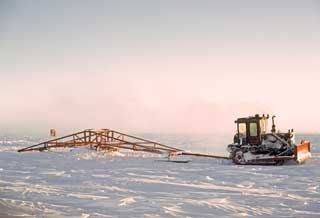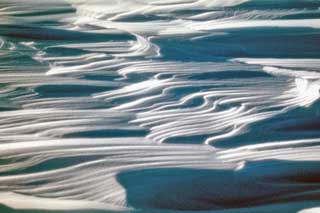We started this project in early October. Our skiway was 14,000 feet long and 250 feet wide not including the taxiway.
 This equipment is a "land plane" which is basically a road grader on skis. More commonly they are used to shape irrigated farmland in the western US. Anyway, first we would tow this back and forth to break up the hard crusted snowdrifts (sastrugi) and level the surface. Usually we used the D4 which had a decent heater, but your feet got very cold after awhile. After the entire skiway has been planed at least once, the second step was to drive 2 tractors along opposite edges of the skiway with a long ship anchor chain dragging between and behind them. After doing this a few times, the third step was to let it harden up for a few days. Of course sometimes Mother Antarctica had other ideas and a storm would drift things up so you would have to start over.
This equipment is a "land plane" which is basically a road grader on skis. More commonly they are used to shape irrigated farmland in the western US. Anyway, first we would tow this back and forth to break up the hard crusted snowdrifts (sastrugi) and level the surface. Usually we used the D4 which had a decent heater, but your feet got very cold after awhile. After the entire skiway has been planed at least once, the second step was to drive 2 tractors along opposite edges of the skiway with a long ship anchor chain dragging between and behind them. After doing this a few times, the third step was to let it harden up for a few days. Of course sometimes Mother Antarctica had other ideas and a storm would drift things up so you would have to start over.

Since it took awhile to cover the entire skiway, many of us took turns driving. This hero shot was taken before (or after) one of my turns. When we started doing this it was -95°F but of course that meant there was no wind hence no extra loss of body heat through your clothes. If you ate a good breakfast and dressed properly you could work outside all day. Of course, you would feel much warmer if you were working and walking instead of sitting in a tractor with your feet on the cold steel floor.
Some people wore sunglasses or goggles, but there was no requirement to do so and many people including myself did not. The major concern of the day was snow blindness because of course the ozone hole had not been found yet. I don't recall much sunscreen around either.

At the end of my shift, I'm following tractor tracks
across the sastrugi as I head for home in the dome.

Speaking of sastrugi, here's a rather artistic photo
that Tadashi took at some point during the winter.
This view shows some of the nicer wind-sculptured
sastrugi that we found. Most of these were rock-
hard and you could trip over them if you were not
careful--especially when it was dark.
|